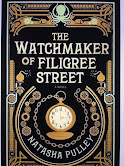The Power of Books by Theresa Gauthier
The Memory Library by Kate Storey
Where to begin? I can start with comments about the Author’s name and how she was born to tell stories. I can dive into describing what happens in the book, and how the protagonist grows and changes by the end, but in truth the most striking thing about this book is neither of those things.
Kate Storey’s The Memory Library uses books in a way everyone should embrace. I mean that. Books aren’t just a way to pass the time. They can be, of course, but they can also be so much more than that.
Books are a tool to connect people to each other. Sharing a favorite with friends or family and being able to discuss it—even if everyone who reads it has a different opinion about it connects you like nothing else.
Books are a way to awaken memories of days past. How many of us had a favorite books as kids, then never think of it until one day we see it—maybe a kid in our lives is reading it or someone mentions it in conversation—and memories flood back of the joys it brought when we read it for the first time? I own books that instantly conjure where I was when I read them in extreme detail. I know in what room I read them, I remember sounds, odors, conversations with others about it. It’s as good as time travel.
Books are a way to teach your children, to make them look at something in a different light, and in the best of circumstances, that child’s perception could well teach you something, too.
Within the pages of The Memory Library, books are also a bridge between people, among friends, and even between strangers, fostering community, friendship, loyalty, and kindness.
The premise of the novel is simple enough; a woman, Ella, goes home to help her mother after an accident. The drama emerges from their estrangement. Ella lives in Australia while Mum Sally lives in London. Ella and Sally haven’t spoken in more than 20 years. We begin to uncover why as the book goes on, but it’s the relationship between these two women, and indeed among the rest of Sally’s community, that brings this book to life.
Sally’s life is a surprise to her daughter, who seems to have imagined her mother having no contact with anyone in the twenty-one years of their estrangement. Being back in her childhood home starts as a duty she’s intent on fulfilling so she can race back to her real life. Then things get a bit more complicated.
Thanks in no small part to the disparate characters who populate this world—including a one-eyed cat names Hadron Collider—and the fact that Ella is on extended leave from her job and has no job-related stress for the first time in years, Ella and Sally begin to take their first steps toward reconciliation.
There’s too much in this book that I don’t want to spoil, but I will mention that the library—and there are several in the book, but you’ll know the one I mean—is a joyous celebration of life. It’s here that books become the best thing they are: affirmations, a way to show gratitude and love, and a way to bring people together.
The Memory Library is a book I’ve needed in my life, though I never knew that until I read it. I imagine I’ll read it again from time to time, and I’m sure I’ll think of it, and recommend it, often.







Comments
Post a Comment